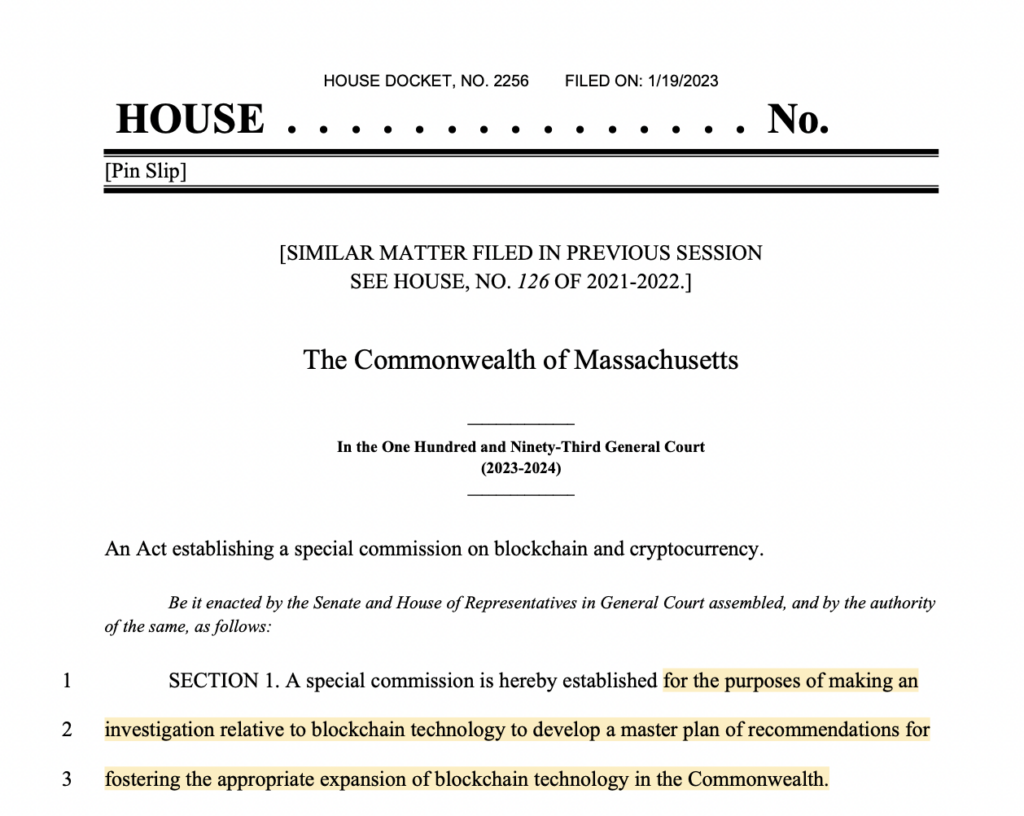[ad_1]
Two bills related to crypto were introduced to the Massachusetts House of Representatives on Jan. 19. The first related to a new “special commission on blockchain” and the second on “protecting consumers in cryptocurrency exchanges.”
Given the recent publicity received through the FTX collapse, it is unsurprising that officials would look to add extra consumer protection. The creation of a ‘special commission’ on blockchain could also be a bullish indicator for the citizens of Massachusetts, providing the commission receives adequate information to analyze.

Special Commission
Massachusetts Representatives Josh S. Cutler and Kate Lipper-Garabedian submitted the bill entitled “An Act establishing a special commission on blockchain and cryptocurrency” on Jan. 19 to create a steering group within the Massachusetts House to look at blockchain technology.
“For the purposes of making an investigation relative to blockchain technology to develop a master plan of recommendations for fostering the appropriate expansion of blockchain technology in the Commonwealth.”
The commission is planned to contain 25 members, including the House Speaker, the minority leader, and the president of the Senate, suggesting, if passed, the commission is to be taken seriously.
The commission is designed to focus on several key areas
- The feasibility, validity, admissibility, and risks related to using blockchain technology for government usage within Massachusetts.
- Whether its definition of blockchain is sufficient concerning enforceable laws.
- The potential impact on the Massachusetts state revenues of digital assets and cryptocurrencies.
- Government and business advisory availability, with a focus on cannabis retail stores.
- How energy consumption may need to be regulated.
- Any additional consumer protections required for retail users of crypto.
- “Best practices for enabling blockchain technology to benefit the commonwealth.”
- Which state entities should be responsible for the enforcement of blockchain regulations.
- Any other blockchain-related topic suggested by the commission.
“The commission shall take input from a broad range of stakeholders with a diverse range of interests affected by state policies governing emerging technologies, privacy, business, finance, the courts, the legal community, and state and local government.”
According to the bill, the commission will report its findings within one year of the authorization as it looks to “foster a positive blockchain technology environment.”
Consumer protection
A further bill was filled with the title “An Act protecting consumers in cryptocurrency exchanges.” The bill was submitted by Representative Susan L. Moran to “protect” consumers engaging with crypto exchanges.
The bill is directed at businesses that offer crypto trading or conversion operating in the state of Massachusetts or with Massachusetts customers.
However, given the specific wording of the bill, the new rules should not apply to Decentralized Exchanges (DEXs) within Massachusetts. The bill describes a Massachusetts customer as “a person who uses a virtual currency exchange service whose information on record with or available to said exchange service indicates a Massachusetts home address.”
Therefore, any site able to operate within the U.S. without any KYC requirements would not be affected.
A vital aspect of the bill is the requirement for crypto exchanges operating in the state of Massachusetts to pay the state an annual “Registration fee” of 5% of gross revenues.
Further, businesses must retain any advertising materials used to promote crypto for no less than seven years. All marketing must also include the business’s legal name and confirmation of its registration to operate a cryptocurrency business.
To attempt to combat incidents such as the FTX collapse reoccurring, the bill also requires businesses to “disclose in clear, conspicuous writing all material risks to the person associated with the particular virtual currency business activities in which it engages.”
Virtual Currency Insurance Fund
The bill also introduced the concept of a Virtual Currency Insurance Fund to protect customers against fraud. The insurance pool will be funded through payments related to any violations of the newly proposed regulations. Each violation shall come with a fine of up to $5,000 per violation.
Customers will be able to receive grants from the fund if they have crypto assets held with an exchange “that is unable to meet any monetary obligations to any of its customers.”
[ad_2]
Read More: cryptoslate.com









 Bitcoin
Bitcoin  Ethereum
Ethereum  Tether
Tether  XRP
XRP  Solana
Solana  USDC
USDC  TRON
TRON  Dogecoin
Dogecoin  Lido Staked Ether
Lido Staked Ether  Cardano
Cardano  Wrapped Bitcoin
Wrapped Bitcoin  Hyperliquid
Hyperliquid  Wrapped stETH
Wrapped stETH  Bitcoin Cash
Bitcoin Cash  LEO Token
LEO Token  Sui
Sui  Chainlink
Chainlink  USDS
USDS  Stellar
Stellar  WhiteBIT Coin
WhiteBIT Coin  Avalanche
Avalanche  Toncoin
Toncoin  Binance Bridged USDT (BNB Smart Chain)
Binance Bridged USDT (BNB Smart Chain)  Shiba Inu
Shiba Inu  Litecoin
Litecoin  WETH
WETH  Wrapped eETH
Wrapped eETH  Ethena USDe
Ethena USDe  Monero
Monero  Hedera
Hedera  Polkadot
Polkadot  Coinbase Wrapped BTC
Coinbase Wrapped BTC  Bitget Token
Bitget Token  Uniswap
Uniswap  Dai
Dai  Pepe
Pepe  Pi Network
Pi Network  Aave
Aave  Ethena Staked USDe
Ethena Staked USDe  OKB
OKB  BlackRock USD Institutional Digital Liquidity Fund
BlackRock USD Institutional Digital Liquidity Fund  Bittensor
Bittensor  sUSDS
sUSDS  Aptos
Aptos  Cronos
Cronos  Internet Computer
Internet Computer  Jito Staked SOL
Jito Staked SOL  NEAR Protocol
NEAR Protocol  Ethereum Classic
Ethereum Classic